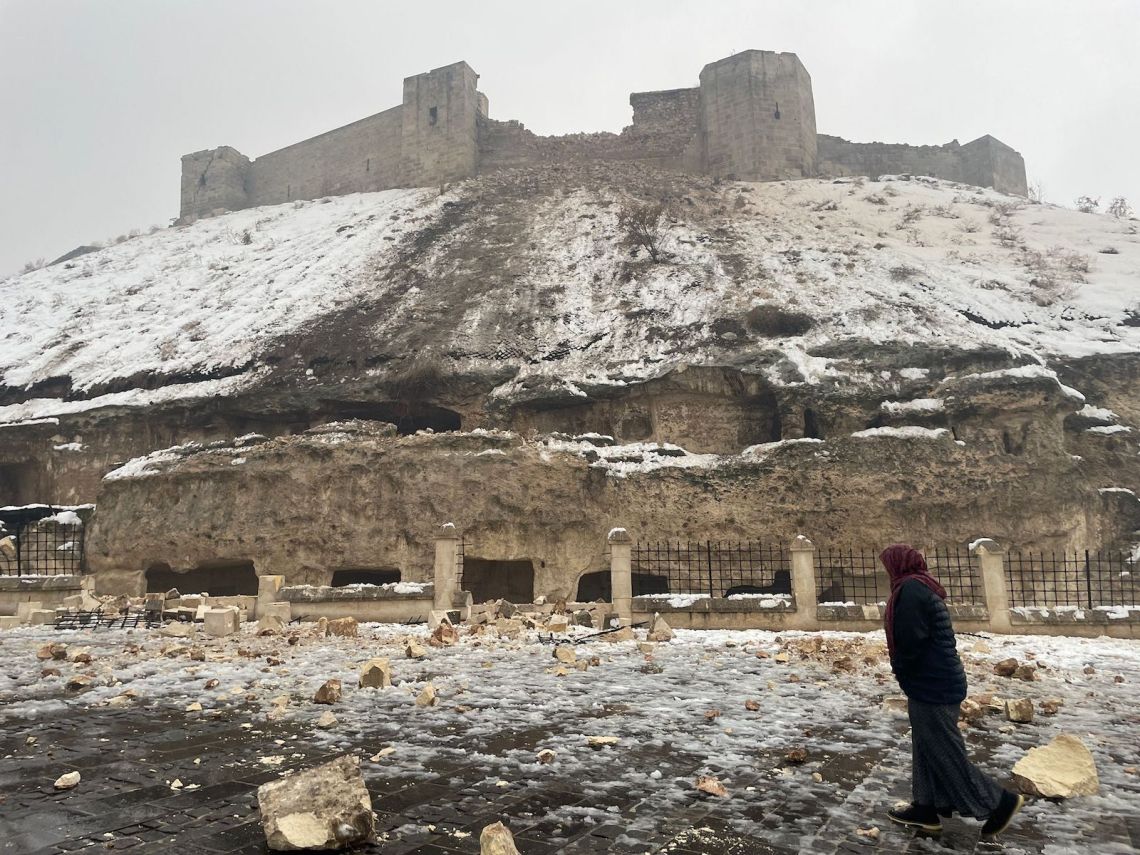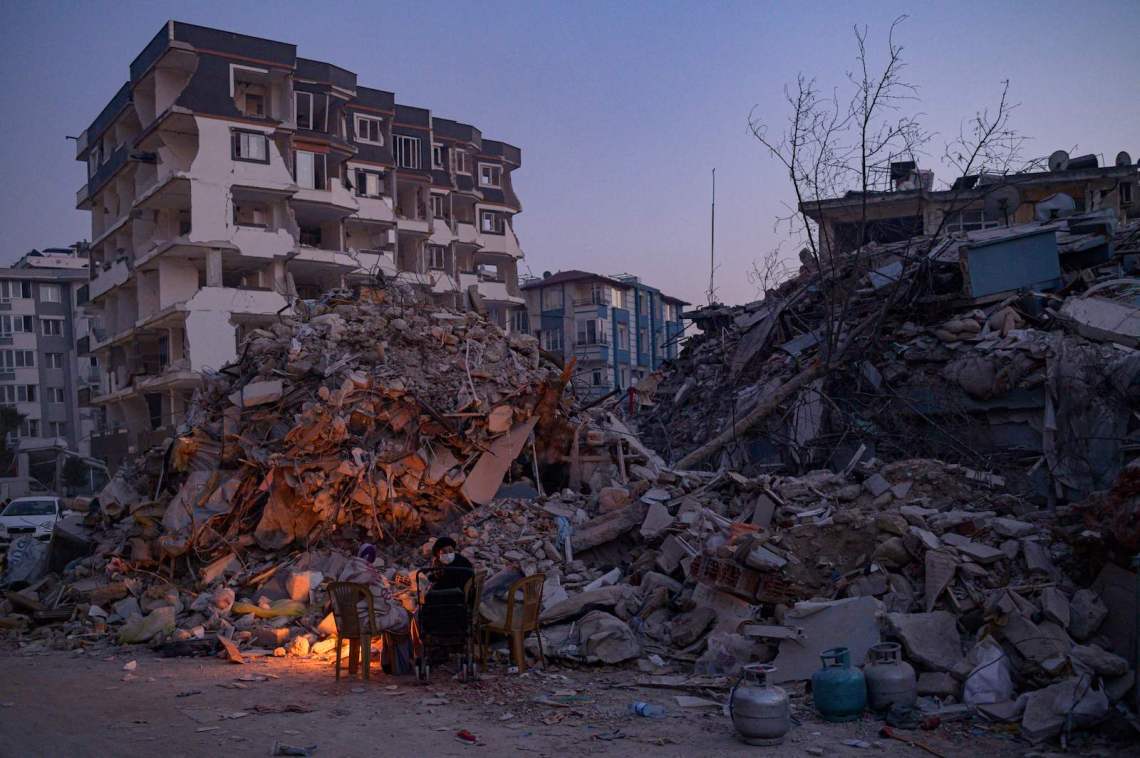February 6, 2023
The first moment, when information is scarce, is the most uncanny. My aunt, hit by a biblical earthquake of 7.8 magnitude at 4:17 AM, reports she’s alive, shielded in a car in Gaziantep that “still shakes like a cradle.” My uncle, she says, might have died if the quake had hit last year, when he was recovering from open-heart surgery. She describes the sound of the tremor as a “grumbling” that “went on and on.”
Gaziantep, or Aintab as it was called before 1921, was a multiethnic Ottoman town. Turks, Arabs, Sephardic Jews, Uzbeks, Kurds, and Armenians populated its stone-paved streets. The city’s landmark, Gaziantep Castle, built by the Romans and expanded by the Byzantines, has been perched on a hill since the second century. The first thing I see in the morning when I wake up in Istanbul are photographs of its collapsed bastions, walls, and iron railings lying on the highway, as if aerially bombed.
My cousins are organizing a trip to Gaziantep to bring family members back. Another cousin, reporting the story for Associated Press, also plans to travel south. Minutes later, our plans are curtailed. The roads have collapsed, bridges have fallen, the Hatay Airport is out of order, the Kahramanmaraş and Gaziantep airports have been closed to civil flights. The government asks people not to drive to cities hit by the quake. Around 10 AM, words typed by survivors emerge on Twitter. “I’m under rubble. My name is X. My address is Y. My phone’s charge is at Z percent.”
At 1:24 PM a second quake, nearly as powerful as the first, hits. Buildings collapse on live television. There is something desperate in our collective inactivity. Muted drone videos of destroyed buildings give a sense of what just happened. People report hearing cries from the rubble. Many wail in Arabic: Turkey has been hosting 3.6 million Syrians who escaped the civil war since 2011. This evening, some will return home in caskets.
Those of us who want to act, can’t. Those on the ground—carpark attendants, neighbors, shopkeepers—are traumatized, but they do their best. Four-fifths of all the injured were brought to hospitals in civilian vehicles, a doctor from Gaziantep tells me over the phone.
Night falls. “No electricity,” says my aunt. “No heating. No water. No bread. Nothing.”
February 7
Relatives, friends, and colleagues share names and addresses of loved ones, forming a map of the dying that will soon become a map of the dead. After the first seventy-two hours, people under the rubble have diminishing chances of survival. Hundreds of debris sites have been left to their fates during the freezing night. The government response so far has been chaotic.
The official agency responsible for the rescue, AFAD, was founded in 2009. It reports to the Ministry of Interior. Since the quake hit, thousands of young people have volunteered to work for AFAD at the debris sites. Largely under-equipped, many have never set foot in these cities. The agency’s lack of coordination over the past two days has surprised many. Turkey, a global humanitarian actor in Africa and the Middle East, with aid operations in Pakistan, Somalia, and Myanmar, appears unprepared for a crisis inside its own borders.
Many Kurds and Alevis live in Diyarbakır, Hatay, and Adana, three of the ten cities hit by the quake. In 2019 the Turkish government appointed “trustees” to three cities with majority Kurdish populations, including Diyarbakır, replacing elected mayors from the leftist-progressive HDP party with loyal placeholders. (In 2018 HDP was the only party to vote against a legislative package proposed by the governing party, the AKP, that included giving amnesty to the owners of roughly 7.5 million unlicensed, unsafe buildings.) So far mayors from CHP, the main opposition party, have been allowed to run Hatay and Adana. A newspaper reports this morning that Turkey’s president, Recep Tayyip Erdoğan, spoke first yesterday with the cities’ governors, whom he appointed, and called the mayors of Adana, Mersin, and Hatay later in the day—an indication of the extreme centralization and repression of local politics that has defined his regime over the past decade.
The president addresses the nation and declares a state of emergency in ten provinces for three months. It’ll end seven days before this year’s presidential and parliamentary elections, scheduled for May 14. Erdoğan also warns against those “attempting to create social chaos using inhumane techniques” and proclaims that “this is not the day to discuss.” When the day comes, he adds, the state will “open the notebook” it’s been keeping on the “troublemakers.”
February 8
A reporter approaches a woman who survived the earthquake on Habertürk TV. “I’ve emerged from the debris,” she begins, “but my mother, father, and sister are still trapped inside. So many days have passed, and not one vehicle has arrived here.” The reporter walks away, as if fearing the woman is about to say something too angry to air. The survivor looks on desperately before the camera moves away from her.
Advertisement
During the 1999 Marmara Earthquake (magnitude 7.6) Turkey’s mainstream media took authorities to task. The destruction, it insisted, was the preventable outcome of a bribe-driven government in cahoots with property developers. Headlines attacked the prime minister, his ministers, and their regime: “Murderers”; “Health Minister: Shut Up”; “The Collapse of the State.”
The AKP, which rose to power on the back of that dissatisfaction with “the old Turkey” and the economic crisis the earthquake quickened two years later, has been savvy about manipulating the media. Starting in 2009 it used tax levies to punish news networks critical of its policies, spent government funds to pressure newspapers and television channels into firing opposition journalists, and censored investigative reporting. In the past half-decade the party has resorted to simpler tactics, physically raiding newsrooms and handing the institutions to trustees.
With more than 80 percent of Turkish media under its thumb, the regime wields enormous power over the population’s hearts and minds. On CNN Türk, commentators speak of the quake as a metaphysical event, disassociating it from the economic and social policies the government pursued over the past two decades. The New Turkey’s economic model has long relied on using cheap credit to drive up construction. With minimal taxation of the rent earned on land, a rapidly expanding informal economy, and the president in charge of decisions like the sale of public land in Istanbul, Turkey has become increasingly dependent on transportation and housing initiatives. Erdoğan described one of them—an artificial sea-level waterway plan to connect the Black Sea to the Sea of Marmara—as his “crazy project.”
February 9
Last night, Turkey throttled access to Twitter to curb “disinformation.” In the process, it silenced distress calls sent by survivors. “Twitter has been informed by the Turkish government that access will be reenabled shortly,” tweets Elon Musk. On Monday, he said SpaceX could send a Starlink satellite to avoid severe communication failures. An anonymous senior Turkish official told Bloomberg that while they were thankful for Musk’s offer, Turkey “had enough satellite capacity” and that its base stations were working with battery power.
This afternoon, journalists covering the earthquake report severe communication failures in southern Turkey. It may be that the government refused the Starlink offer to retain control of data; had it accepted the invitation, it would have found it hard to enforce strict censorship laws on the satellite Internet system and identify “troublemakers.” Last year an investigation by the independent journalism platform Medyascope revealed that Turkey’s Information Technologies and Communications Authority (BTK) has collected the Internet activity, identity, and personal data of all users in Turkey since 2021. “This data sent to BTK is not anonymized,” according to Medyascope’s reporting, meaning that “each data packet is sent to the institution with the identity of the user.”
The AKP has used such control tactics since 2013, when Occupy Gezi, a leftist movement led by urban planners and environmentalists, demanded an end to Erdoğan’s crazy projects. Last year the philanthropist Osman Kavala was sentenced to life in prison for “trying to overthrow the government.” Seven other Gezi activists were convicted of aiding him and sentenced to eighteen years in jail. Among them are Tayfun Kahraman, a senior urban planner in Istanbul, and the architect Mücella Yapıcı. Kahraman, the former head of Istanbul Municipality’s Earthquake Risk Management and Urban Improvement department, was personally involved in mapping out Istanbul’s buildings most vulnerable to an earthquake—the person who perhaps knows best what effects the long-awaited Istanbul earthquake will have.
“Nothing will be the same after this,” a doctor from Şanlıurfa tells me. “The things I experienced in the Van-Erciş Quake in 2011 are happening again.” The Turkish Medical Association, another organization targeted by the AKP, announced this afternoon that ten doctors died in Adıyaman, Hatay, and Adana during the quake.1
An English construction director writes me an email detailing his mission to locate relatives of his Turkish wife trapped in a building in Hatay. “The concrete was like sand,” he says. Beach sand had been used in construction as an aggregate; he found seashells in the concrete. He describes the spirit of solidarity in the city, men on mopeds giving him rides, coming across a displaced mother and two children sitting outside a stadium covered in dust. “The young boy ran up to me with a pack of biscuits offering them. They clearly had nothing yet still offered this.”
February 10
Mehmet Yaşar Coşkun, the independent contractor of the “Renaissance Residence,” a luxury building project in Hatay that housed an estimated 1,000 residents and collapsed from the quake, is detained at Istanbul Airport. (The airport itself was a crazy project, constructed on what one journalist called “a wetland patched with old mines and quarries.”) He’s carrying 10,200 euros. Lawyers file criminal complaints so that prosecutors can arrest dozens more such contractors. But the current mixture of cheap credit and unregulated construction will likely continue even after other contractors are detained.
Advertisement
A reporter for the national broadcaster, TRT, summarizes the situation: 20,000 people have died and hundreds of others were saved, some after spending more than a hundred hours under rubble.2 A masked man enters the frame. “Will you ask them why they’ve left us all alone for fifty hours, for two days? Will you ask them that? Ask them, tell them.” His voice is quickly muted. Cut to the studio, where the anchor complains about technical glitches. On CNN Türk, another anchor calls criticism of the government “hot air.”
“We’re more comfortable today,” Erdoğan tells journalists. “We’ll be even more comfortable tomorrow.” “All this,” he tells a survivor, “has its place in fate’s plan.” Reporters learn that each survivor will receive $531. Soon afterward the figure rises to $745. The AKP will shortly commission tycoons to construct new mass housing projects for survivors, turning the disaster into a business opportunity. Experts on television networks talk about the increased safety standards of these new projects, which are slated for completion in a year, while tax money accumulates in relief funds that the government will distribute to friendly construction companies. Whole family histories, meanwhile, have been decimated. At the moment there’s little clarity about whether the next elections will remain scheduled for May. The wheels of the New Turkey keep spinning.



